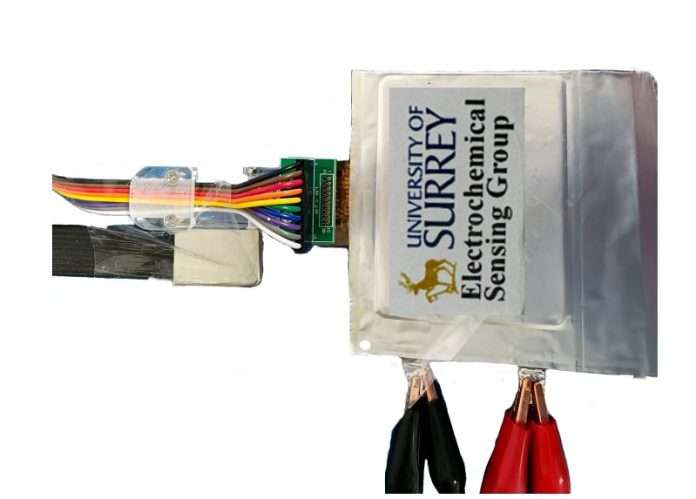
A team of researchers from the University of Surrey has developed a new type of smart sensor that could prevent fires in lithium-ion batteries before they even begin.
These batteries are widely used in electric vehicles, renewable energy storage, airplanes, and other modern technologies—but when they fail, they can catch fire or explode, causing serious damage and safety risks.
What makes this new innovation special is that the sensors are built inside the battery, rather than attached to the outside like most current systems.
By being placed deep inside, the sensors can quickly detect problems such as overheating, pressure buildup, chemical changes, or physical stress.
This real-time monitoring gives early warnings of danger and can even activate fire-resistant materials inside the battery to slow down or stop a fire from happening.
Dr. Kai Yang, a lecturer in energy materials and nanotechnology at the University of Surrey, explained that battery fires are very difficult to put out once they start.
So, the best solution is to stop the fire from starting in the first place. The sensors they’ve developed not only track temperature but also actively respond to rising heat, which adds another layer of safety.
The technology is designed to be low-cost and easy to add to existing battery production lines. That means companies won’t have to completely redesign their batteries to use these smart features.
Instead, they can simply integrate the sensors into key parts of the battery, such as the current collectors and separators, which are already part of its internal structure.
With electric vehicles becoming more common and a UK ban on new petrol and diesel car sales starting in 2035, battery safety is becoming more important than ever.
Fires caused by battery failures have been a major concern for both manufacturers and consumers. These smart sensors could help ease those concerns by making batteries safer and more reliable, especially in high-risk areas like aviation and maritime transport.
Beyond safety, these sensors could also help batteries last longer and be recycled more easily. Since lithium-ion batteries are expensive and full of valuable materials, better monitoring could lead to smarter ways of managing their life cycles and recovering useful parts after use.
Professor Ravi Silva, director of the Advanced Technology Institute at Surrey, said this innovation supports global clean energy goals and could also help create new patents, spin-off companies, and jobs in the UK.
The University of Surrey has already filed for a patent and is looking for partners to bring the technology to the market, potentially making battery-powered devices and vehicles much safer for everyone.



